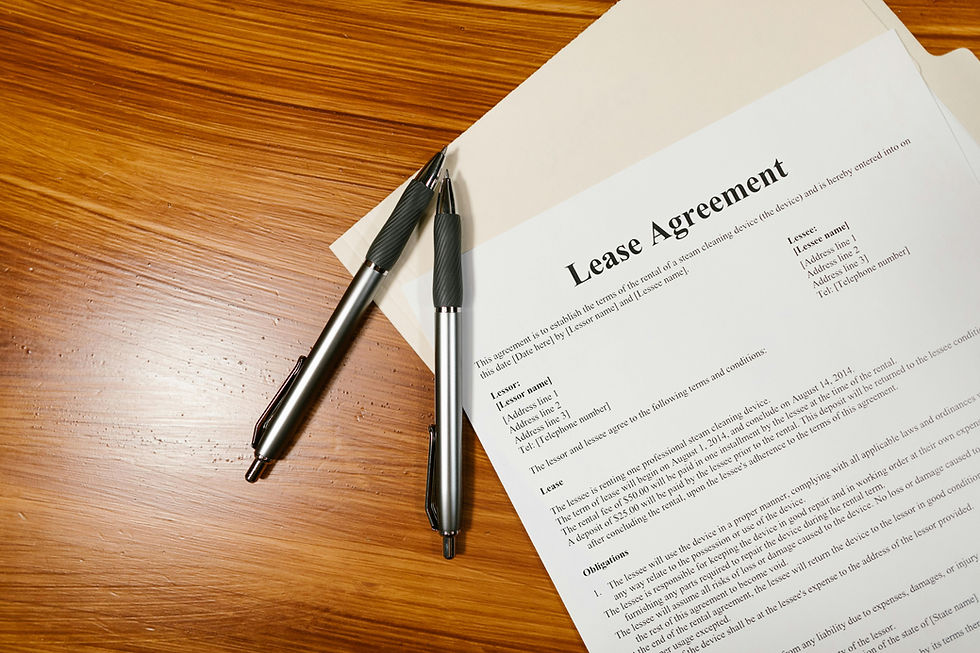Top Five Things Landlords Look for When Evaluating a Prospective Tenant
- eweinblatt3
- Jun 29, 2025
- 4 min read

Securing the right office or commercial space isn’t just about finding the perfect location—it’s also about convincing the landlord that you are the right tenant. In a competitive market, tenants often underestimate just how thoroughly landlords evaluate them during the leasing process..
According to commercial real estate expert Ezra Weinblatt, understanding a landlord’s mindset gives you a critical advantage:
“A lease is a long-term partnership. Landlords aren’t just looking for a renter—they’re looking for reliability, financial strength, and alignment with the building’s long-term strategy.”
Whether you're a startup looking for your first office or an established firm relocating, here are the top five things landlords look for when evaluating a prospective tenant:
1. Financial Stability and Creditworthiness
xzzThe most obvious—and arguably most important—factor is the tenant's ability to pay rent consistently over the lease term. Landlords often request financial documentation including:
Audited financial statements or profit & loss statements
Bank references
Credit reports
Proof of funding (especially for startups)
Why it matters:
A financially stable tenant means lower risk for the landlord.
Tenants with strong financials may gain leverage in negotiations for buildouts or rent concessions.
Ezra Weinblatt advises clients to be proactive:
“If your business is strong, show it. Present clean, organized financials early on—it builds credibility and confidence.”
2. Business Model and Industry Type
Landlords don’t just evaluate how much a tenant can pay—they also assess what the business does. Certain industries are seen as more volatile or disruptive to other tenants in the building.
Preferred tenants often include:
Professional services (law firms, accounting, tech)
Medical offices with long-term leases
Government or nonprofit organizations
Potential red flags:
Nightlife businesses or bars in office zones
Startups in high-burn industries without solid revenue
Businesses with a history of litigation or complaints
Ezra Weinblatt explains:
“Landlords aim for a tenant mix that maintains property value and stability. Even if your financials are strong, your business model must align with the building’s ecosystem.”
3. Space Usage and Fit
How you intend to use the space is another crucial factor. Landlords want tenants whose needs fit the infrastructure of the building and won’t require costly or disruptive adjustments.
What landlords evaluate:
Expected foot traffic and noise levels
HVAC and utility demands
Hours of operation
Need for signage or exterior modifications
Example:
A tenant seeking heavy machinery use in a high-rise office building may be seen as a mismatch, even if they can afford the rent.
Ezra Weinblatt emphasizes planning ahead:
“Before you tour, know your ideal layout and operational needs. Be ready to explain how your business will integrate with the property.”
4. Tenant Reputation and Background
Beyond numbers, landlords care about who is leasing their space. A tenant with a strong reputation brings value to the building, while a troubled history raises red flags.
Key checks landlords perform:
Google and news searches
Social media presence
Legal or regulatory history
References from past landlords
A tenant with positive press, community engagement, or a strong leadership team will stand out.
Ezra Weinblatt recommends:
“Treat landlord meetings like investor pitches. Highlight your track record, achievements, and leadership team. You’re selling stability.”
5. Length of Lease and Growth Potential
Landlords prefer tenants who plan to stay and grow. Long-term leases provide consistent income and reduce turnover costs. If a business shows potential for expansion, it becomes even more attractive.
What helps:
Clear business growth plans
Flexible space needs or expansion clauses
Strong employee retention metrics (for office leases)
What hurts:
One-year leases with no renewal
Vague business models without projections
Signs of downsizing or instability
According to Ezra Weinblatt, your growth story can be a powerful tool:
“Landlords love tenants who evolve within their buildings. If you show you're in growth mode, you become an asset—not just a renter.”
Bonus Tip: Presentation and Communication
First impressions matter. From the first call to the lease negotiation, how you communicate can impact the landlord’s trust and decision.
Do:
Be responsive and professional
Ask informed questions about the space and property
Show that you’ve researched the landlord and the building
Don’t:
Hide financial weaknesses (they’ll find out)
Push unrealistic timelines or renovation demands
Delay paperwork or ghost during negotiations
Landlords are more likely to negotiate and support a tenant who is cooperative, transparent, and easy to work with. As Ezra Weinblatt puts it:
“People lease to people. Be the kind of tenant they’d want in their building for 5–10 years.”
Final Thoughts about Evaluating a Prospective Tenant
In commercial leasing, it's not just about finding the right space—it’s about making landlords feel confident that you are the right fit. By understanding and addressing their top concerns, you improve your chances of securing the ideal property on favorable terms.
If you're preparing to enter lease negotiations or exploring commercial spaces, working with an expert like Ezra Weinblatt can give you an edge. His insights, negotiation experience, and understanding of landlord psychology help businesses navigate real estate with clarity and confidence.
Connect with Ezra Weinblatt on LinkedIn or visit EzraWeinblatt.com for expert guidance on your next move.


